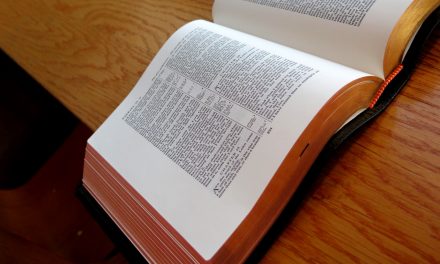I used to be a believer in baptism only for professing believers for about 5 years after the Lord saved me. Recently though I began to look seriously at the issue. I took for granted that it was the right position and that infants, as they don’t have the ability to profess faith in Christ, should never be baptised. After all, I used to say, there is not one explicit example of an infant being baptised in the New Testament so it would seem that the case was closed. It would seem that, to many, Infant Baptism is a heresy that is only for those who have not left behind the Church of Rome completely.
There are however major problems with taking our understanding of the sacraments purely from the New Testament as all scripture needs to be consulted (2 Timothy 3:16-17). To understand the sacraments we must understand what they are and what they signify and seal.
Sacraments are outward signs and seals of the mysteries of God (Romans 4). They manifest or show outwardly God’s covenants with man. In the covenant of works in the garden of Eden we had the sacraments of the Tree of the knowledge of Good and Evil and the Tree of Life; in the Noahic covenant we have the sacrament of the Rainbow (Genesis 9:13-16) and a figure or type of Baptism as they passed through the waters (1 Peter 3:20-21); the Abrahamic covenant has the sacrament of circumcision which was for adults males who professed faith in the promise (Genesis 17), Jesus Christ, and for the households of those believers; the Old Covenant has the passover and the New Covenant has the sacraments of Baptism and the Lord’s Supper.
As these sacrament display the mysteries of God’s covenants with man, we must understand the nature of the covenants and especially of God’s gracious covenant with men. Failure in these areas will leave us with an incomplete picture and also with a false sense of understanding the issue.
The Divine Covenants
In Genesis Chapters 1-3 we see the fall of man. Adam was the federal head of all mankind (Romans 5:12). He failed in the one task given to him to test his obedience to the Law of God written on his heart (Romans 2:15). Adam was in what is called by reformed theologians ‘a Covenant of Works’ as the covenant was dependent upon perfect compliance to the Eternal Law of God (summarised in the 10 commandments). But as soon as Adam fell, man was incapable of keeping the law of God (Romans 8:7). Man was now without hope while his dependency was in compliance to the Law of God. God in Genesis 3:15 however established a relationship with sinners based on grace alone as man can in no way maintain his good standing with God as man is a criminal naked in his own filthy rags (Isaiah 64:6). Christ came in order to fulfil broken covenant on the behalf of those chosen in Him before the foundation of the world (Matthew 5:17; Ephesians 1:4-7).
The same everlasting covenant of grace can be seen as an expression in time, in both testaments, of the eternal covenant of Redemption between the God the father and God the son. It is important to realise this as they are in a sense two different covenants. The Covenant of Grace is between God and fallen men, but the Covenant of Redemption which was established before the world began is between the Father and the Son. The Covenant of Redemption includes all the aspects of predestination and election. The Covenant of Redemption was a promise or an oath based on the work or faithfulness of Christ in time. The Covenant of Redemption of course then could not fail as Christ could not fail. Christ was promised to all that he would purchase at the cross (Psalm 2:7-9) based on the condition of the completion of His mission which was given to Him by the Father (John 5:30; 7:16; 8:50)
The Covenant of Grace however is been always been between God and men. God established his covenant with believers, those who He effectually called and regenerated, such as Noah and Abraham. Included in this covenant was Noah and his household, and also Abraham and His household (Genesis 9:15-17; 17). This covenant is also called ‘the everlasting covenant’. It cannot therefore be done away with until the end of time itself. It may have an administrative change (2 Corinthians 3) but it cannot be abrogated as it is everlasting in time.
A covenant is simply an pledge, oath or agreement based on certain conditions between two or more parties. All covenants are based on conditions. Christ infallibly purchased all those who He represented in the Covenant of Redemption (John 17:9; Ephesians 1:5-6) but for the Covenant of Grace we must have faith in Christ (i.e. by being regenerated by the Holy Spirit and receiving that gift of faith; Ephesians 2:8-10). These conditions in the covenant of grace are free gifts of God and are not causal, as we are hopelessly incapable of cooperating with our salvation (Ephesians 2:1-3). Those children of the covenant who show by their life and works that they do not believe (unregenerate) have broken the everlasting covenant (Isaiah 24:5). The church has a responsibility to those under this covenant (i.e. the professing visible church of God) by practicing Biblical church discipline which will be accepted by the regenerate soul and rejected by the unregenerate soul. This often manifests itself as people being given over to Satan as they are excommunicated from the society of believers (1 Corinthians 5:5; 1 Timothy 1:20).
This promise, of being in covenant with God graciously (and of God being their God), is given to those that believe and their children in the old covenant (Deut 29:29, Proverbs 22:6, 2 Timothy 3:15; Deut 30:19; Psalm 102:28). Many scriptures deal with the blessings given to the children of believing parents. Also children were included in the visible covenant community in the Old Testament. This was the case, according to many Credobaptists and Paedobaptists alike, until the New Covenant promised in Jeremiah 31:31-33 arrived. This time came in Acts 2 at Pentecost which was followed by the preaching of Peter.
Now the claim is made that no instances are noted of infants being baptised in the New Testament, but it can also be said that children are not ever excluded from the covenant. What has not been changed from the old covenant remains in the new (Matthew 21:43) unless we want to concede ground to dispensationalism. That Kingdom of Grace continues and has come with the power of Christ (Revelation 12:10; Mark 9:1). This Kingdom of God on Earth is also of a mixed nature with some who are not regenerate (Matthew 8:12). The Jews in Acts 2 knew the covenantal language and if a great change was to occur, i.e. children are now excluded from the covenant, we would expect to see it here. Peter however uses explicit covenantal language that the promise (or the covenant of grace promised in Genesis 3:15) is unto them (those who believed while unbelieving Jews were cut off from the covenant due to unbelief as seen in Romans 11:20) and to their children in Acts 2:39. The Jews knew this language very well and could see that children were included in the covenant just before. Acts 2:39 talks of them who were in attendance, that they would receive the sign and seal of the covenant of grace (Acts 2:38), along with their household (1 Corinthians 1:16; Acts 16:15), and all those who were afar off (the Gentiles) were included in the covenant. Not every Gentile was included though as not every professing Jew was included but those that, as the verse says, “as many as God shall call.” This qualifier is on the Gentiles grafted in along with their children.
In a similar pattern we see whole households being baptised in the New Testament (Acts 16:15; 1 Corinthians 1:16). While the instances of household baptism does not mention who was baptised or who was in the household but it does indicated that no change had occurred in who was in the covenant. The Bible is not silent on who is to be in covenant with God; believers and their children are set apart to serve God (1 Corinthians 7:14). The children in this sense are holy as they are in the visible church. This does not mean they are regenerate but also we should not presume that they are not. We are to treat our children, not according to our own understanding, but according to God’s will (Proverbs 3:5-6).
Circumcision and Baptism
Circumcision was a really important sign and seal (Romans 4:11; Genesis 17) of the covenant of grace in the Abrahamic administration of the covenant. Children and all in Abraham’s household are seen to be part of this covenant. But not all remained faithful (not all were saved or regenerated like Ishmael but still he was circumcised; Genesis 17:26). Circumcision, just like Baptism (regardless of the view you hold within the realms of orthodoxy) cannot guarantee salvation (Romans 4). Abraham received the sign after he believed, just as someone who has never been baptised would be received into the visible church by being baptised.
There are many instances that point towards the fact that Baptism and Circumcision signify and seal the same thing. The both point to regeneration (Romans 2:28-29) as a person must be Baptised spiritually into Christ and have a circumcised heart to be saved. Christ is the one who spiritually washed us clean (Titus 3:5; 1 Corinthians 6:11).
The clearest place to see the link between spiritual circumcision and spiritual baptism is Colossians 2:11-12. If we are circumcised spiritually we are also baptised spiritually. We are in union with Christ. However if we do not lay hold upon the promises of the gospel then the truth of the sacrament of baptism will not benefit us, like if we do not receive the Word of God by faith. It will be a sealed document with not content that will not benefit us if we remain in unbelief.
Before the cross there was the shedding of blood but that all stopped with the shedding of Christ’s blood (Daniel 9:27). Circumcision was also particular to males who represent women but in the new covenant but this is no longer the case (Galatians 3:28). Now in the New Covenant where there is a vast increase in knowledge and the blessings of God’s Spirit (Hebrews 8), both men and women receive the sign of the covenant.
The old testament pointed towards what will come in the New Covenant. Blood as it looks towards Christ is replaced with water. This is seen in passages such as this picture of regeneration in Ezekiel 36:25-27 that is not used until the new covenant in an outward sign and seal.
The picture of baptism is also used to describe the passage of the Israelites through the red sea showing that all of the covenant community, at least typically, received the covenant sign (1 Corinthians 10:2), being baptised in the cloud unto Moses. That would without doubt include children. Also if Baptism is by immersion only and if only professing adult believers alone are to be baptized then this would be a strange word (baptized) to use to describe what is happening.
Conclusion
I believe the Church was at its most blessed and purest during various periods of the reformation. Such a spread of the reformed faith across Europe left Rome licking her wounds with only Italy and Spain to prop her up. While there were some differences over some issues but never among the major confessions on the issues of the inclusion of believer’s children in the covenant and of infant baptism. Baptist Confessions did arise in the mid to late 1600s which did excluded children from the covenant, and hence from baptism; but these authors often admit that what they taught was a radical departure from the covenant theology of the reformation. They often admit that it was entirely new. What accompanied such change? Revival such as was seen in Scotland during John Knox’s time which has seen many generations of Christians follow their example within God’s covenant? I would argue that we do not see these abundant blessings as we have generally excluded in the modern church, like the Anabaptists of old, our children from the visible Church (Genesis 17:14) and cut them off from the blessings of the covenant.
How we view our children as either in or out of the Church is vital. If infant baptism was such a heresy why did God bless the reformation as he did and does (as seen in churches who truly understand and practice it), and why do many Credobaptist churches rarely survive past a generation or two? These are generalisations of course and many other areas need to be considered but it must make one pause to think. Could our view of the covenant have anything to do with it? Should we rediscover old truth taught by the church for centuries or look towards radical departures from the faith God graciously blessed in the reformation?
Further Study
http://www.loughbrickland.org/cms/index.php/q-a/30-q-a-should-babies-be-baptised






Hi Paul,
Great information on Paedo Baptism and very solid! Just wanted to ask a few questions in regards to apostasy for Padeo Baptists and it may trickle into assurance. Do you have a personal e-mail I can write to you?
Thanks